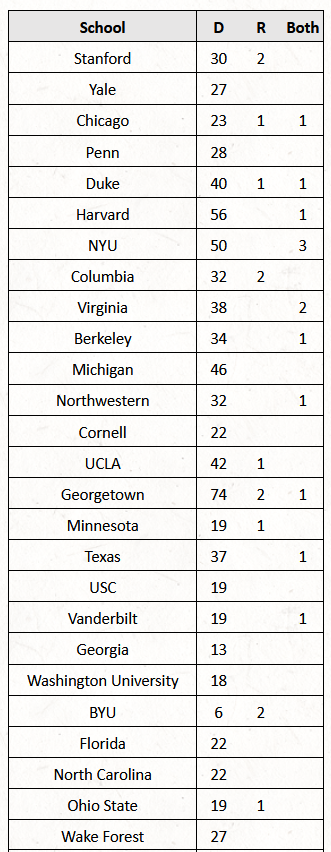Derek T. Muller, a Notre Dame Law School professor, recently published research on his personal site showing the political contributions of his fellow law professors at major American law schools. What he found is not surprising, but it is fairly disheartening to those who hold traditional American beliefs on things like freedom of speech, limited government, and a free-market economy, and want them passed on to the next generation.
Unlike earlier research by The College Fix that looked at the party registration of professors (finding 16 times more registered Democrats than Republicans at UNC Chapel Hill), this research looked solely at which party these professors donated to. And when they put their money where their minds are, it is decidedly left of center.
Most schools on the list didn’t have a single law professor that donated to a Republican candidate. Of the law schools he looked at in North Carolina (Duke, UNC Chapel Hill, and Wake Forest), only Duke had a professor who gave exclusively to Republicans (and also another professor who had given to candidates of both parties). The other 40 Duke professors gave exclusively to Democrats.
At UNC Chapel Hill and Wake Forest University’s law schools, there wasn’t even a token Republican professor. Every single professor who made political contributions donated solely to Democrats.
This of course excludes professors who made no contributions or whose contributions were not reported because they were less than $200. So it’s possible there are Republican professors who are stingy with political donations (or don’t give because they don’t want to be identified as the campus wingnut).

But, as the chart above shows, from what we know, there are 89 law professors at these three top North Carolina law schools who donate exclusively to Democrats and only a single (likely frightened) Duke professor who donates exclusively to Republicans.
When I posted these figures on social media, most of the comments defending this reality said one of three things:
- Too bad. It’s free speech.
- They may all be left-wing, but professors don’t let their views taint their lessons.
- They only hire smart people, and left-wingers are smarter.
It’s true that private universities like Duke and Wake Forest have a right to hire who they want and that those professors have the freedom to their views. But it’s still worthwhile to know that virtually everyone being chosen to teach has a left-wing worldview.
That leads to the second defense, that maybe they can hold these views while still teaching from an absolutely unbiased objective perspective. Those who think this is likely, or even possible, haven’t met many left-wing professors. They could also talk to any recent conservative college graduate, who would gladly give them hours of examples about how, say, a lesson on Shakespeare turned into a discussion against the gender binary or how there was at least one mention of Donald Trump in every meeting of their art history course.
And on the third point — that the left has simply won every intellectual battle so the only people smart enough to be professors are left-wingers — I’m sure that feels really nice for those on campus to assume. Off campus, though, the common understanding of these battles is very different.
In fact, many not-all-that-stupid people think the left has lost, or is in the process of losing, pretty much every major intellectual battle of recent decades.
- Command economies vs. free markets
- Open borders
- Solar and wind vs. nuclear and natural gas
- Pushing radical gender theory
- Opposing school choice
- “Harm reduction” to solve drug crisis
- Defunding police during spike in violence
- Shutting down schools and businesses during COVID
- Downplaying impact of debt on inflation
- Abandoning merit and equality under the law for Diversity, Equity, and Inclusion (DEI)
I’m sure they have their own understandings of all these issues, but many of those views only thrive because they go unchallenged in a bubble free of inconvenient facts.
I liked most of my college professors, back in the early-to-mid 2000s, and I do think their hearts were in the right place often, like with wanting to keep the planet healthy, protect the vulnerable, and advance human dignity. As a lefty at that time, I largely nodded along. But most of their well-intentioned solutions to these real problems have enormous unintended consequences — inefficient, intermittent energy from solar panels leads to increased costs and decreased reliability; “harm reduction” strategies for drugs enable users and lead to spikes in crime and overdose deaths; defunding police leads to more violence; and on and on.
Regarding DEI and merit, schools, like Duke University’s School of Medicine, appear to explicitly choose their students and employees by taking into account whether they are of a certain race or gender. Another well-intentioned idea, DEI tries to solve a real problem left over from segregation (that of racial imbalances), but does so in a clumsy, and probably illegal, way, by rejecting individuals simply for falling in categories like white, Asian, male, or otherwise “privileged.” (Kind of ironic, isn’t it, to give the label “privileged” to the groups denied opportunities for schools and jobs?)
A better way of ensuring diversity and inclusion at these schools would be to accept all the top-performing students, based on traditional metrics (GPA, SAT, ACT, etc), and then expose these students to views representative of the current ideological landscape, not just that of the progressive vanguard. This would give the students a more accurate picture of the world and of what they will encounter once they leave campus. But for this to take place, there would likely need to be more than one Republican for every 91 law professors.